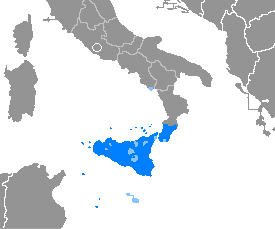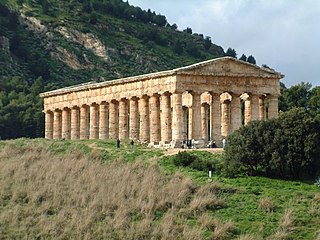
Sicily is the largest and most populous island in the Mediterranean Sea and one of the 20 regions of Italy. The Strait of Messina divides it from the region of Calabria in Southern Italy. It is one of the five Italian autonomous regions and is officially referred to as Regione Siciliana. The region has 5 million inhabitants. Its capital city is Palermo.

Robert Guiscard was a Norman adventurer remembered for the conquest of southern Italy and Sicily. Robert was born into the Hauteville family in Normandy, went on to become count and then duke of Apulia and Calabria (1057–1059), Duke of Sicily (1059–1085), and briefly prince of Benevento (1078–1081) before returning the title to the papacy.

Giuseppe Tomasi, 11th Prince of Lampedusa, 12th Duke of Palma, GE, known as Giuseppe Tomasi di Lampedusa, was an Italian writer, nobleman, and the last Prince of Lampedusa. He is most famous for his only novel, Il Gattopardo, which is set in his native Sicily during the Risorgimento. A taciturn and solitary man, he spent a great deal of his time reading and meditating, and used to say of himself "I was a boy who liked solitude, who preferred the company of things to that of people."

Diana, Viscountess Norwich was an English actress and aristocrat who was a well-known social figure in London and Paris.

John Julius Cooper, 2nd Viscount Norwich,, known as John Julius Norwich, was an English popular historian, travel writer, and television personality.

Sicilian is a Romance language that is spoken on the island of Sicily and its satellite islands. A variant, Calabro-Sicilian, is spoken in southern Calabria, where it is called Southern Calabro notably in the Metropolitan City of Reggio Calabria. Dialects of central and southern Calabria, the southern parts of Apulia and southern Salerno in Campania, on the Italian peninsula, are viewed by some linguists as forming with Sicilian dialects a broader Extreme Southern Italian language group.

The Kingdom of Sicily was a state that existed in the south of the Italian Peninsula and for a time the region of Ifriqiya from its founding by Roger II of Sicily in 1130 until 1816. It was a successor state of the County of Sicily, which had been founded in 1071 during the Norman conquest of the southern peninsula. The island was divided into three regions: Val di Mazara, Val Demone and Val di Noto.

John Frederick Norman Lewis was a British writer. While he is best known for his travel writing, he also wrote twelve novels and several volumes of autobiography.
Andrew Norman Wilson is an English writer and newspaper columnist known for his critical biographies, novels and works of popular history. He is an occasional columnist for the Daily Mail and a former columnist for the London Evening Standard. He has been an occasional contributor to The Times Literary Supplement, New Statesman, The Spectator and The Observer.
The expulsion of the Jews from Sicily began in 1493 when the Spanish Inquisition reached the island of Sicily and its population of more than 30,000 Jews.

Sicilian Baroque is the distinctive form of Baroque architecture which evolved on the island of Sicily, off the southern coast of Italy, in the 17th and 18th centuries, when it was part of the Spanish Empire. The style is recognisable not only by its typical Baroque curves and flourishes, but also by distinctive grinning masks and putti and a particular flamboyance that has given Sicily a unique architectural identity.
Beati Paoli is the name of a secretive sect thought to have existed in medieval Sicily and possibly also in Malta. The sect, as described by the author Luigi Natoli in his historic novel I Beati Paoli, resembles an order of knights fighting for the poor and the commoners. Whereas the novel is fictitious, Sicily's history bears some evidence that the Beati Paoli actually existed.

The Emirate of Sicily or Fatimid Sicily was an Islamic kingdom that ruled the island of Sicily from 831 to 1091. Its capital was Palermo, which, during this period, became a major cultural and political center of the Muslim world.
Robert of Selby was an Englishman, a courtier of Roger II and chancellor of the Kingdom of Sicily. It is likely that his name indicates that he was from Selby in Yorkshire. He probably journeyed to Sicily about 1130. In his train was Thomas Brun.

The history of Sicily has been influenced by numerous ethnic groups. It has seen Sicily controlled by external powers – Phoenician and Carthaginian, Greek, Roman, Vandal and Ostrogoth, Byzantine Greek, Aghlabid, Fatimid, Kalbid, Norman, Aragonese and Spanish – but also experiencing important periods of independence, as under the indigenous Sicanians, Elymians and Sicels, and later as County of Sicily, and Kingdom of Sicily. The Kingdom was founded in 1130 by Roger II, belonging to the Siculo-Norman family of Hauteville. During this period, Sicily was prosperous and politically powerful, becoming one of the wealthiest states in all of Europe. As a result of the dynastic succession, then, the Kingdom passed into the hands of the Hohenstaufen. At the end of the 13th century, with the War of the Sicilian Vespers between the crowns of Anjou and Aragon, the island passed to the latter. In the following centuries the Kingdom entered into the personal union with the Spaniard and Bourbon crowns, while preserving effective independence until 1816. Sicily was merged with the Kingdom of Italy in 1861. Although today an Autonomous Region, with special statute, of the Republic of Italy, it has its own distinct culture.
Siculo-Arabic, also known as Sicilian Arabic, is the term used for varieties of Arabic that were spoken in the Emirate of Sicily from the 9th century, persisting under the subsequent Norman rule until the 13th century. It was derived from early Maghrebi Arabic following the Abbasid conquest of Sicily in the 9th century and gradually marginalized following the Norman conquest in the 11th century.

The term Norman–Arab–Byzantine culture, Norman–Sicilian culture or, less inclusively, Norman–Arab culture, refers to the interaction of the Norman, Byzantine Greek, Latin, and Arab cultures following the Norman conquest of the former Emirate of Sicily and North Africa from 1061 to around 1250. The civilization resulted from numerous exchanges in the cultural and scientific fields, based on the tolerance shown by the Normans towards the Latin- and Greek-speaking Christian populations and the former Arab Muslim settlers. As a result, Sicily under the Normans became a crossroad for the interaction between the Norman and Latin Catholic, Byzantine–Orthodox, and Arab–Islamic cultures.

John (Jack) William Gordon was an English writer of young-adult supernatural fiction. He wrote sixteen chlldren's fantasy novels, including The Giant Under the Snow, four short story collections, over fifty short stories, and a teenage memoir.
The Sicilian nobility was a privileged hereditary class in the Kingdom of Sicily, the Kingdom of the Two Sicilies and the Kingdom of Italy, whose origins may be traced to the 11th century AD.

Susanna Mary Clarke is an English author known for her debut novel Jonathan Strange & Mr Norrell (2004), a Hugo Award-winning alternative history. Clarke began Jonathan Strange in 1993 and worked on it during her spare time. For the next decade, she published short stories from the Strange universe, but it was not until 2003 that Bloomsbury bought her manuscript and began work on its publication. The novel became a best-seller.













